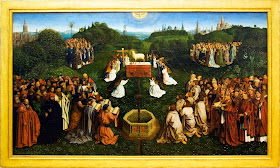Twenty-second Sunday in Ordinary Time
When I was a junior in college seminary, I had the chance to do a study abroad in Rome for the Fall Semester. My studies were at the Angelicum, not that far from the Colosseum. In fact, in one of our classes, if you looked out the window, you could see the Colosseum. The first time I saw the Colosseum, it was amazing. The tenth time I saw the Colosseum it was pretty cool. The twentieth time I saw the Colosseum it was ok. After seeing it daily, sometimes multiple times in a day, it honestly lost a lot of its charm. But when my parents and sisters came to visit at Christmas, they were so excited to see the Colosseum, and were in awe of it when I took them there.
What we experience on a regular basis can become pretty boring because we are so used to it. There’s that phrase that we hear from time-to-time: familiarity breeds contempt. It can happen with places, even places like the Colosseum. It can happen with people; how many times do we take for granted those who are closest to us? It can happen with the Mass.
Now, this is the point where some of you are about to turn off your hearing aids or your attention, because it’s another Fr. Anthony homily on the Mass. Contrary to what the Letter to the Hebrews says, Mass might be better attended if it had “blazing fire and gloomy darkness, and storm and a trumpet blast and a voice speaking words…” from the clouds. And yet, the author states that it’s not that, and implies that it’s something better.
In Mass we approach:
Mount Zion and the city of the living God, the heavenly Jerusalem, and countless angels in festal gathering, and the assembly of the firstborn enrolled in heaven, and God the judge of all, and the spirits of the just made perfect, and Jesus, the mediator of a new covenant, and the sprinkled blood that speaks more eloquently than that of Abel.
But we’re used to it. We’ve been coming, hopefully every week, and it’s like the Colosseum; maybe it was awe-inspiring at one point, or maybe it still is at different points in our life. But generally, it’s mundane. The homilies don’t always grab me; the music doesn’t always move me; the readings don’t always seem to apply to me.
This is much different from the description of the ambassadors of King Vladimir of Russia in the late tenth century, who, upon attending a Divine Liturgy (think Eastern Rites) at the Hagia Sophia in Constantinople, said, “We knew not whether we were in heaven or on earth, for surely there is no such splendor or beauty anywhere upon earth.” They probably meant the building. And, truthfully, St. Peter’s Basilica in Rome never got old for me like the Colosseum did. St. Peter’s always inspired awe, even as I became familiar with the ins and outs of the building.
But what we have here is much greater than a building. And maybe I’m not the best messenger, but Bishop Barron certainly did a great job in his series on the Mass. I know the parishioners who attended that DVD series told me how much it changed their appreciation of what happens at Mass. At each Mass, we do enter the narthex, as it were, to heaven, to the city of God, and countless angels worship with us, with their eyes veiled to what we humans are allowed to receive: Jesus, the Body and Blood of Christ, which does not cry out to God for vengeance, as did Abel’s blood, but pleads for our forgiveness. And united with us, worshipping God the Father through Christ the Son in the power of the Holy Spirit are all the saints, including the Blessed Virgin Mary, the Mother of God, St. Joseph, St. Pius X, Sts. Ambrose, Athanasius, Augustine, and John Chrysostom, your patron saints, and the whole multitude of heaven. That’s a pretty impressive thing.
To be honest, I sometimes forget this, so it’s not as if you’re alone in this temptation. But when I take a minute to sit back and think about it, I remember just what is going on, and I wonder at the great mystery in which I am able to participate. After all, what we come to is not a what, but a Who, God, who communicates His life through His Word, through the signs, and especially through the Sacrament of the Body and Blood of Jesus. All those things I said earlier may still be true: the homily may not grab you, the music may not move you, and the readings may not seem to apply to you. But you get to spend time with Jesus, who loves you more deeply than anyone else could, who died for you because He loves you, and can think of no other place better to be than right here with you.
There are so many places in the world where this simple joy, the joy of coming to Mass, is not possible on a weekly, let alone a daily, basis; where coming to Mass means walking miles, sometimes as many as some of you ran or walked in the Crim; where coming to receive Jesus who shed His Precious Blood for you means you may shed your blood in witness to Him. Let’s do what we can–preparing for Mass throughout the week; pre-reading the readings before Mass begins; thinking of all the people who need prayers and all the good and bad things that we want to offer with the bread and the wine–to make sure that coming to Mass does not become as routine as seeing the Colosseum every day in Rome.

